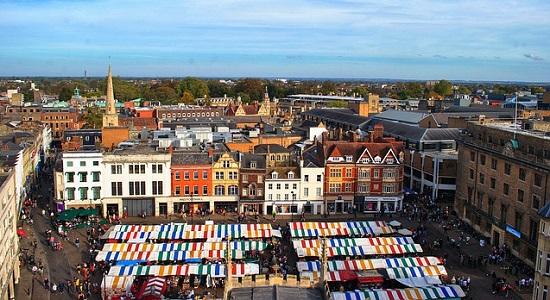The budget, which was approved by Council last Thursday (25 February) outlines how the council will meet these challenges despite the ongoing costs of helping the city recover from the coronavirus pandemic, and a reduction in government revenue support grant from £5m in 2013 to nil by 2019.
Following approval of the budget it has been confirmed that a household living in a Band D property in Cambridge will pay £1,928.39 in Council Tax from April, of which £207.50 will be retained by the city council. This represents an increase of £5 per year in the city council’s share for residents with Band D properties.
Cllr Mike Davey, Executive Councillor for Finance and Resources and Cllr Lewis Herbert, Leader of the Council, have produced a short video outlining some of the key points from this year’s budget. The video can be viewed here.
The council’s budget outlines how the council will allocate resources and fund priorities through new and continued spending plans in three core areas:
Tackling poverty and inequality, and helping people in greatest need including:
Further preventing homelessness and rough sleeping
Working with the Community Food Hub to deliver unused and donated food to voluntary groups
Funding groups that help the most vulnerable residents
Continuing to fund cultural activities which promote community cohesion
Investing in services for children, young people and families
Taking action on climate change, biodiversity and the environment, including:
Leading the city on reducing carbon emissions and increasing biodiversity,
Investing further in energy efficiency and generation projects
Managing streets and open spaces for the benefit of wildlife and people
Creating an additional Climate Change Officer post
Installing new electric vehicle charging points and replacing council vehicles with electric versions where possible
Investing in carbon reduction measures at swimming pools, the council’s biggest energy users
Delivering quality services within financial constraints while transforming the council:
Establishing a new Economic Recovery Officer to work with local business to enable a swift and robust response to the pandemic
Investing in ICT and digital technology to modernise services and deliver savings while keeping the council financially secure.
A 2.47% increase in Council Tax has been agreed as part of the budget. Council Tax raises 9.8% of the council’s annual income of £91.8 million. People on low incomes and vulnerable people will continue to be helped to pay Council Tax bills through the council’s Council Tax reduction scheme for 2021-22.
For 2021-22, the city council’s share of Council Tax collected in the county will be 10.76%, with the majority going to Cambridgeshire County Council (72.59%), the Cambridgeshire Police and Crime Commissioner receiving 12.84% and a further 3.81% going to the Cambridgeshire Fire Authority.
The council’s Housing Revenue Account Budget was also approved by Council. This sets out in detail how the council will:
Build another 1,000 new council homes by 2030 in addition to more than 500 already in progress or completed – including ultra-low carbon Passivhaus homes – continuing one of the most ambitious local authority housebuilding schemes in the country
Ensure all tenants in financial difficulty are supported, including through a Financial Inclusion Officer
Invest in the council’s existing housing stock over the next 10 years to ensure homes are modern, comfortable, safe and secure
A decision was also taken at the meeting to continue the out of hours element of the council’s Pinder Service, which assists livestock grazing on Cambridge’s open spaces. The grazing of commons is a significant and well recognised contributor to the biodiversity of the city and encourages a range of habitats that support plants and insects. The council remains committed to continuing this grazing custom and practice and issues grazing licences annually. For more information visit www.cambridge.gov.uk/grazing-permits
Cllr Mike Davey, Executive Councillor for Finance and Resources, said: “Our balanced budget for 2021-22 will protect and improve services, especially for those experiencing hardship in the city in the wake of the pandemic.
“At the time the budget was published, the total estimated cost of the pandemic to the council in 2020/21 was £16.6m, and this had only partially been mitigated by government grants totalling £8.3m.
“Despite this, our sound financial management over many years has ensured we can still deliver a budget to deliver the services our residents expect, tackle the housing shortage, reduce inequality, lead the city on addressing climate change, and ensure the council’s financial security for many years to come.
“The council’s commitment to retaining grazing cows on our commons and meadows was never in question as we all enjoy our city cows. The decision on the out of hours Pinder Service confirms our ongoing partnership working with graziers.”
Image of Cambridge Market Square by Joshua Miranda from Pixabay
